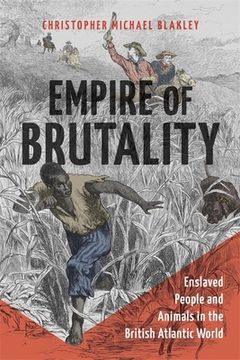Empire of Brutality: Enslaved People and Animals in the British Atlantic World (en Inglés)
Reseña del libro "Empire of Brutality: Enslaved People and Animals in the British Atlantic World (en Inglés)"
In the early modern British Atlantic world, the comparison of enslaved people to animals, particularly dogs, cattle, or horses, was a common device used by enslavers to dehumanize and otherwise reduce the existence of the enslaved. Letters, memoirs, and philosophical treatises of the enslaved and formerly enslaved bear testament to the methods used to dehumanize them. In Empire of Brutality, Christopher Michael Blakley explores how material relationships between enslaved people and animals bolstered the intellectual dehumanization of the enslaved. By reconsidering dehumanization in the light of human-animal relations, Blakley offers new insights into the horrific institution later challenged by Black intellectuals in multiple ways. Using the correspondence of the Royal African Company, specimen catalogs and scientific papers of the Royal Society, plantation inventories and manuals, and diaries kept by slaveholders, Blakley describes human-animal networks spanning from Britain's slave castles and outposts throughout western Africa to plantations in the Caribbean and American Southeast. They combine approaches from environmental history, history of science, and philosophy to examine slavery from the ground up and from the perspectives of the enslaved. Blakley's work reveals how African captives who became commodified through exchanges of cowry sea snails between slavers in the Bight of Benin later went on to collect zoological specimens in Barbados and Virginia for institutions such as the Royal Society. On plantations, where enslaved people labored alongside cattle, donkeys, horses, and other animals to make the agricultural fortunes of slaveholders, Blakley shows how the enslaved resisted these human-animal pairings by stealing animals for their own purposes--such as fugitives who escaped their slaveholder's grasp by riding stolen horses. Because of experiences like these, writers and thinkers of African descent who survived slavery later attacked the institution in public as fundamentally dehumanizing, one that corrupted the humanity of both slaveholders and the enslaved.

